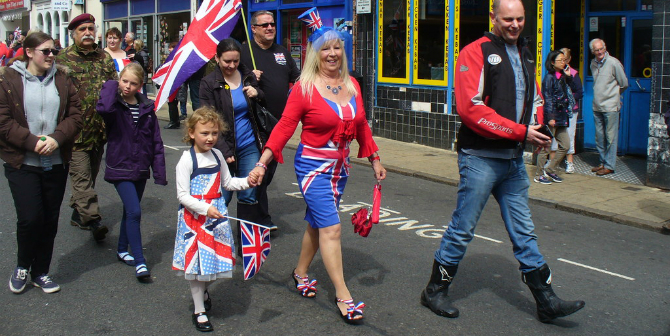 What’s cultural about the ‘culture wars’? In this blog, Charles Leddy-Owen (University of Portsmouth) discusses Brexit and nationalist politics. He claims that the conflation of culture with nationalism is not only simplistic but also problematic as far as it leads us to assign unwarranted causal properties to immigration and ethnic diversity in electoral politics. In his view, Leave voters’ desire to ‘take back control’ of sovereignty and borders was the most explicitly nationalist political moment in recent English history.
What’s cultural about the ‘culture wars’? In this blog, Charles Leddy-Owen (University of Portsmouth) discusses Brexit and nationalist politics. He claims that the conflation of culture with nationalism is not only simplistic but also problematic as far as it leads us to assign unwarranted causal properties to immigration and ethnic diversity in electoral politics. In his view, Leave voters’ desire to ‘take back control’ of sovereignty and borders was the most explicitly nationalist political moment in recent English history.
Some prominent British political scientists are claiming that the 2016 Leave vote signalled the first shots across the bow of a US-style ‘culture war’ – a view recently endorsed in the Guardian by Nick Cohen. The politics of ‘identity’, so the argument goes, are gaining ascendancy over the old ideologies of left and right. Those hunkering down in their respective bunkers – usually portrayed as liberal cosmopolitans and socially conservative nationalists – are seen to embody a more visceral, uncompromising form of politics largely invulnerable to shifts in economic conditions. This diagnosis, if accurate, has critical implications for British politics, promising to shape electoral battle-lines for generations to come.
I will suggest here that such analyses are flawed. They confuse old fashioned state politics – particularly nationalist politics – for culture. By failing to consider how nationalist ideology enframes the very phenomena being measured – for example, a ‘cultural backlash’ or ‘threatened identities’ – they are in danger of taking nationalists’ own word for what culture consists of. A particularly problematic outcome of this is the tendency to assign unwarranted causal properties to immigration and ethnic diversity.
A good place to start is the most cited academic article analysing the result of the UK’s referendum on EU membership. In a 2016 Harvard Working Paper Inglehart and Norris posit that a ‘cultural backlash’ by a broad coalition of voters offers the most effective explanation for the successful Leave campaign. Culture is operationalised by way of survey questions measuring:
- attitudes towards immigration
- trust in global institutions
- trust in national governance
- Authoritarian/liberal attitudes
- Left/right-wing attitudes
Each of these variables is firmly grounded in state politics, how this is organised and executed, by who and for whom. The authors are analysing political attitudes towards the make-up of the demos, how institutions operate and why, and how resources should be allocated. If we consider ‘culture’ to be the ideas, values and beliefs that shape how we live, the perspective taken here is rather narrow. In particular, by focusing in large part on questions concerned with immigration, global/national institutions and governance, we seem to be dealing with inveterately nationalist political concerns.

By nationalism I am not referring to far-right or ethnonationalist politics but to something far more prevalent – the principle, identified by Gellner, holding that nation and state should be congruent. Nationalism in this sense is the dominant political framework of the modern era. Notwithstanding the imperfect fit between many states and nations, and the dissolving effects of globalisation on ties of nationhood, we live in a world dominated politically by nation-states. In this context, Leave voters’ desire to ‘take back control’ of sovereignty and borders was the most explicitly nationalist political moment in recent English history. Yet nationalist politics are not given any sustained treatment during Inglehart and Norris’ diagnosis of a cultural backlash.
This conflation of culture with nationalism has particularly important implications vis-à-vis the analysis of attitudes towards immigration and ethnic diversity. In the recent Political Quarterly article that inspired Cohen’s Guardian article, Sobolewska and Ford argue that both issues ‘mobilise and polarise’ British voters. They suggest that:
The politics of immigration for the past fifteen years has been characterised by three elements: historically high migration inflows; high levels of public attention and concern; and persistent failure by governments from both parties to deliver effective reforms which either brought down migration numbers or assuaged public concerns.
This all seems accurate enough, but there is a notable absence of any direct reference to the potential impact of nationalist political activity and mobilisation. How did such ‘attention and concern’ about immigration come about? Which ‘concerns’ that apparently needed assuaging emerged, and why? With no active agent in the picture beyond migration inflows and hapless, defensive politicians, immigration as a political issue is positioned as a natural by-product of immigration itself (twice the authors state that immigration ‘unavoidably’ sows division). This is a problematic premise.
It has, for example, been clearly demonstrated that media coverage of immigration was very negative during the period in question and that such coverage has affected attitudes. Murphy and Devine suggest that extensive and disproportionate media coverage of UKIP aided the party’s fortunes. And the anti-immigrant rhetoric adopted in mainstream politics, culminating in the creation of the explicitly ‘hostile environment’, has been well documented.
How all of this is causally related to notorious ‘perception gaps’ – the average Briton believes that thirty rather than thirteen per cent of Britain’s residents were born overseas – is a complicated question. But what seems clear enough is that we should be very wary about positioning immigration itself, and questions about how to deal with it politically, in isolation from a media and political environment that has very actively influenced how the issue is being imagined.
There is, furthermore, compelling evidence for significant differences between nationalist attitudes as expressed in surveys on the one hand, and social practice on the other. As Fox has demonstrated, we know remarkably little about the relevance of nationhood to actually-lived lives. Research finds that those who are hostile to immigration are far more likely to be concerned with the national than local level – and, at the latter, it seems that people tend to get on most of the time. Even when they don’t, a recent study suggests that pre-existing prejudice and socioeconomic inequalities account for such patterns.
Analyses citing culturally-driven political conflict, ‘unavoidable’ division as a result of immigration or innate psychological dispositions towards in- and out-groups as a result of immigration – the notion that ‘most of us prefer our own kind’ – are therefore empirically dubious. Such analysis blurs with nationalists’ ideologically mapped self-definitions of culture and ideas about who constitutes the demos – the political ‘we’.
This analytic blind-spot is the product of an overreliance on the concept of culture where the concept of nationalist political ideology would be more useful. As Breuilly states in his classic Nationalism and the State, through ideology we relate ‘particular material and moral interests to a broader terrain of action’. Ideology offers maps but also, crucially, shapes the very terrain we operate in by bringing particular social and political concerns into the foreground while obscuring others. And though nationhood is of course cultural in character – ‘long shadows on county grounds’, the Britishness of tikka masala, and so on – most of the variables that Inglehart and Norris or Sobolewska and Ford ascribe to ‘culture’ are fundamentally measuring exactly the kinds of political relationships between state and nation with which nationalist ideology is concerned.
If Britain is faced with an ideological rather than cultural bifurcation then the implications are significant. Ideologies can be deeply politically ingrained but it is important to remain sceptical about their popular resonance and salience, especially when we know so little about how they operate in relation to everyday lives and culture. If the divisions highlighted in recent political science research and represented in the 2016 referendum and its aftermath are less socially embedded than presumed this places before us a rather different beast to the more intransigent, visceral cultural conflict many are imagining. There may yet be space for either side to gain substantial ground through empathetic political argumentation and, where relevant, socioeconomic redistribution.
This article gives the views of the author, and not the position of LSE Brexit, nor of the London School of Economics. © Copyright Colin Smith and licensed for reuse under this Creative Commons Licence.
Charles Leddy-Owen is Senior Lecturer in Sociology at the University of Portsmouth. His research interests relate to nationalism, migration and race in contemporary England. Charles’ first book – Nationalism, Inequalities and England’s Political Predicament – is due to be published by Routledge in April 2019.






